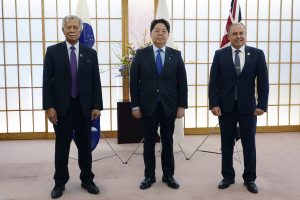Late last month, Japan hosted the 2nd Japan Pacific Islands Defense Dialogue (JPIDD), this time as a physical event. The first JPIDD had been held online at the height of the COVID-19 pandemic in 2021. The conference discusses security issues related to the Pacific Islands region, inviting the defense ministers and senior officials of three countries with armed forces (Fiji, Papua New Guinea, Tonga), 11 non-armed island countries, and seven other partner countries (Australia, Canada, Chile, France, New Zealand, the United Kingdom, and the United States).
Specific topics included illegal, unreported, and unregulated (IUU) fishing, maritime security pertaining to piracy and transboundary crime, space, cyber, influence operations, and other new security issues as well as non-traditional security issues that impact the region, such as climate change.
Moreover, at a ministerial-level meeting with the armed island states, the Japanese government proposed accepting foreign students at the National Defense Academy of Japan and pledged to provide Fiji with patrol boats and other related equipment as an Official Security Assistance grant. Meanwhile, the Japanese government also used the meeting to emphasize collaboration with organizations such as ASEAN, the Pacific Islands Forum (PIF), and the South Pacific Defense Ministers’ Meeting (SPDMM), as well as openness to other regions.
The basis of Japan’s security commitment to the Pacific Island countries (PICs) is the defense cooperation that Japan has built with ASEAN. In other words, Japan seeks to promote regional stability and development by respecting regional centrality and unity, as well as helping regional states improve their coping capacity, while also affirming universal principles such as the rule of law and freedom.
It is clear that Japan’s increasing security involvement in the region comes from a sense of wariness about China’s expansion into the Pacific Islands region. China was not invited to the JPIDD. The influx of Chinese people, goods, and money has boosted Beijing’s economic influence in the PICs, especially in the tourism, retail, and infrastructure construction sectors. Moreover, China has signed a security agreement with the Solomon Islands, which has severed diplomatic relations with Taiwan, and has proposed a new security memorandum of understanding to the Fiji government. There are concerns that Beijing’s growing influence in the economic and security spheres will make local political systems more authoritarian and disrupt social development, which in turn will destabilize the regional order.
Chinese expansion is encouraging not only Japan but also other major powers to return to the region. The United States signed a defense cooperation agreement with Papua New Guinea in 2023, seeking to expand its military presence. Australia, a traditional regional power, is also expanding its efforts to accept military officers from PICs and to provide support for capacity building. These countries have also shown a strong interest in the practice of democracy in the Pacific Islands region.
Great power competition over such commitments to the PICs has mixed implications for the regional order. On the positive side, more layers of cooperative frameworks for regional development and security have been created, for instance in the form of PIF, Partners in the Blue Pacific, the China-Pacific Island Countries Foreign Ministers’ Meeting, and the SPDMM. This provides PICs with opportunities and options for development. In recent years, for example, Fiji has sought to advance its national interests while balancing relations with each of the great powers.
Moreover, increasing opportunities to discuss regional security issues such as the JPIDD will contribute to fostering common understanding and trust among countries in the region, helping to increase their ability to deal with common challenges.
Still, it is not easy for some PICs, lacking human resources and with weak policymaking functions, to make sophisticated policy decisions from a long-term perspective. Moreover, although international relations in the region have traditionally been peaceful, there is a risk that if the great powers increase their exclusive involvement, it will lead to conflicts between regional states and domestic divisions. Each island country has its own perceptions and interests, and external actors must be cautious about taking a uniform view of the region.
What is important is that the involvement of great powers aims to provide PICs with options, support capacity building for addressing challenges rooted in local needs, and contribute to improving the security environment of the entire region. In this sense, for the Pacific Islands region to realize its potential and remain peaceful, the great powers need to listen to the countries in the region and seek appropriate involvement.
































